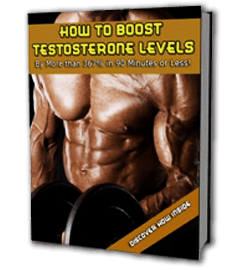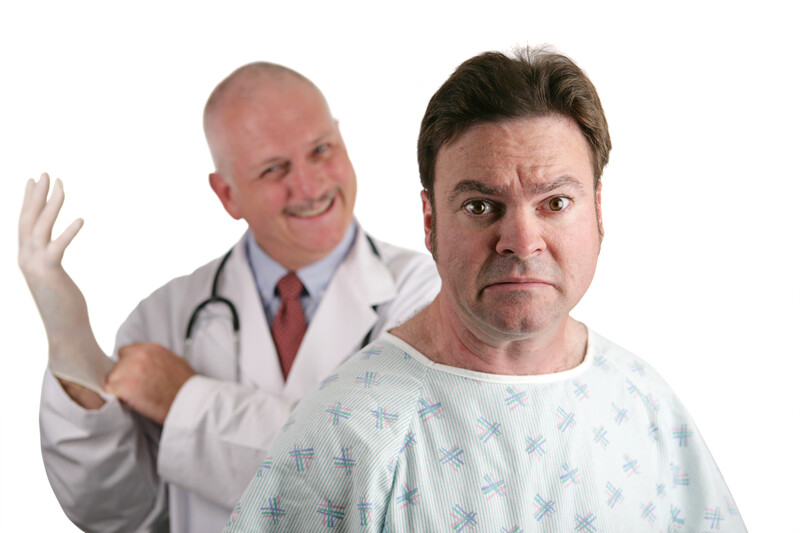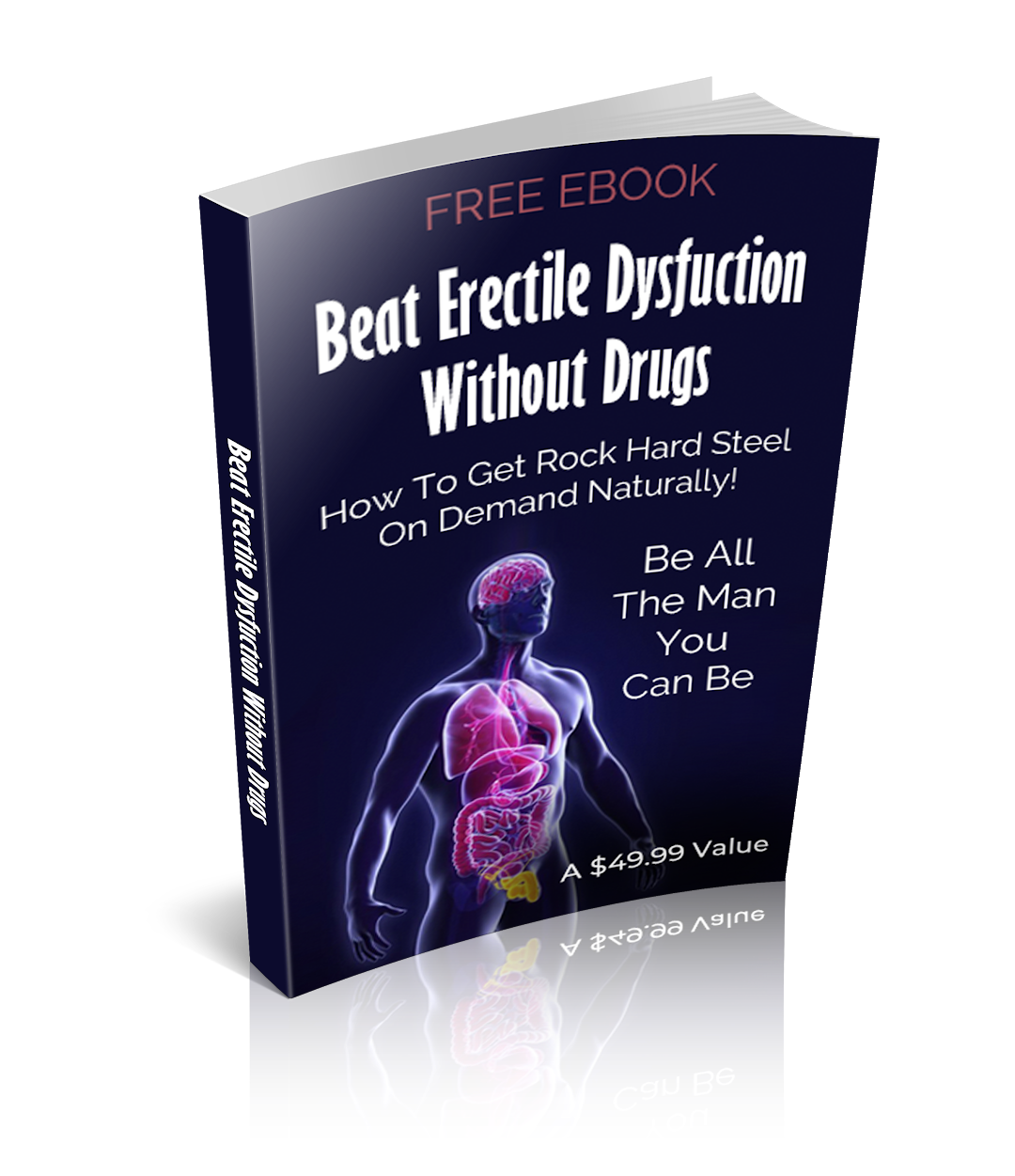(Article medically reviewed by Dr. Zac Hyde M.D)
15 Ways to Boost DHT Naturally
Are you interesting in learning how to increase Dihydrotestosterone?
Smart move.
DHT is one potent hormone, which unlike testosterone, is not converted into estrogen via the aromatase enzyme.
It also brings on the erections and the sex drive Big Time when levels are dialed in just right.
As a matter of fact in the libido and hard wood department it puts testosterone to shame, literally.
It also enhances mood, self confidence and well being.
Unfortunately, DHT can be a double edged sword for men who have a genetic propensity toward baldness or prostate enlargement.
Because if you’re carrying around those genes along with the elevated estrogen commonly found in men over 30, you may run into issues.
I happen to fall into this category and when my DHT levels spike I experience blatant hair loss.

FREE Testosterone Ebook!
+ Hormone Boosting Tips Delivered to your Inbox
Learn 3 Unusual Tricks I Used to Spike My Testosterone Levels By More Than 300%.
But since I’m not willing to give up on this hormone I’ve developed a protocol that allows me to get the benefits of DHT without the prostate or hair loss penalties.
Here’s the plan…
When I start seeing hair on my keyboard or if I have difficulty getting the urine stream going at night, I take one gram of nettle root (not leaf).
I use nettle root because it blocks the conversion of DHT into the harmful estrogen metabolites that cause hair loss and prostate issues.
As a matter of fact, in many European countries, nettle root is the go to treatment for an enlarged prostate.
But I need to warn you…
The nettle must be taken infrequently and in small doses, otherwise it will backfire on you and will actually reduce your sex drive.
For me, this works out to no more that two doses a week, separated by at least two days.
And I only take these two doses if I have the urination or hair loss issues mentioned above which doesn’t happen every single week.
You can see the nettle that I use and read more about it here.
As you’ll see when you click over, nettle also binds to SHBG, the agent that locks up your testosterone so your body can’t use it.
This explains why nettle also increase FREE testosterone in men who use it.
But like I said, if you decide to try nettle, use it in small doses and use it no more than twice a week.
Now here’s David with part 2…
How to Increase Dihydrotestosterone Part 2:
Travel in men’s health circles long enough, and you’ll inevitably come across a hormone called Dihydrotestosterone – or simply DHT.
Despite sharing most of its name with our primary male hormone, DHT is quite different in how it reacts with the body.
It is also different in terms of how people feel about optimizing its levels. In this article, we’ll do a deep dive into DHT in an effort to separate fact from fiction.

Dihydrotestosterone is the Real Deal
First and foremost, let’s get all the science talk cleared up.
Dihydrotestosterone (DHT) is an endogenous (produced in the body) androgen (male) sexual steroid and hormone.
It is created from our circulating testosterone by an enzyme called 5-Alpha Reductase.
Men typically have high levels of DHT during puberty, as it is primarily responsible for causing the onset of adult male characteristics.
How DHT is Made
Here’s an overview of DHT production:
Your body produces three different specific versions of an enzyme called 5-Alpha Reductase. These are conveniently labeled Type 1, Type 2, and Type 3.
These enzymes are responsible for converting regular testosterone into DHT, a process which largely takes place inside the tissues of your penis, testicles, liver, kidneys and brain.
On average, you can expect about 5% of your total T levels to undergo this transformation.
In rare instances, an adrenal androgen called androstenedione can also be converted into DHT as well. It should be noted, however, that this is much more common in women than in men.
The main thing you need to know?
DHT is a Far more potent version of testosterone.
Indeed, one study reported that DHT binds to androgen receptors at two to three times the rate of regular old T.
It also remained active at those receptors for five times longer!
Because of this increased androgenic activity, there is a significant chance of boosting the subject’s libido and general sexual health.
More than that, some research indicates that DHT may also help support mental health, muscle strength, blood sugar control, and your immune system.
So why would something like this be “controversial?”
Well…
DHT Side Effects
When a 2004 study from China indicated that DHT can lead to premature baldness, lots of guys threw in the towel on the hormone altogether.
Sure, bigger muscles and a better sex drive are nice, but what’s the point if you’re going to be bald by 30?
Well, the thing is that there was more to the study than that.
For example, it wasn’t just DHT alone that “caused” the early onset of hair loss. It had to interact with both the male pattern baldness gene and elevated estrogen levels.
Indeed, an earlier study into DHT’s potential side effects had already shown there to be no correlation between DHT and hair loss.
In fact, of the 316 men who participated, 35% indicated a reduced risk of going bald.
DHT and the Prostate

Then there’s what experts like to call “The Prostate Problem.”
Unfortunately, a few studies linked high DHT levels to prostate enlargement, which caused a bit of a panic around the men’s health community at the time.
However, a “link” and a “correlation” are two different things!
If you really dig into it, you’ll find that increases in Dihydrotestosterone (up to 10x in some cases) were still shown not to affect prostate size at all.
Now, if you’re already having prostate problems or are at risk of losing your hair, it’s possible that elevated DHT levels may aggravate these already-existing conditions.
However, this has more to do with your genes and your estrogen levels than DHT itself.
In short: the rumors of DHT’s deadliness were greatly exaggerated.
Dihydrotestosterone Side Effects – The Bottom Line:
I’m the first person to recommend caution when it comes to supplements and side effects.
However, I’m also the first one to point out failures in rational thinking.
For instance, reports of side effects related to DHT tended to increase as men got older.
This is odd because androgen levels go down as we age. It’s also suspect because age is a primary factor in both the activation of the baldness gene and prostate issues.
Curious, right?
Moreover, it’s worth remembering that DHT is primarily responsible for activating puberty in young men.
If elevated levels were correlated with hair loss and prostatitis, why aren’t there more young, bald men running around complaining of their prostate problems?
It might seem like anecdotal evidence, but all this information can be gleaned from actually sitting down and reading the studies.
That said, let’s assume these side effects are possible (even if they are unlikely).
Why would anyone want to purposely raise the DHT levels?
Well, here’s why.
DHT Benefits for Men

- DHT helps control the speed and thickness at which our body and facial hair grow.
- Where testosterone is always at risk of being converted into estrogen by the aromatase enzyme, DHT is immune to this conversion.
- DHT has been shown to improve mood, boost energy, and even increase confidence.
- DHT helps stimulate the body’s fat-burning processes and improves thyroid function.
- While not exceptionally anabolic, DHT can still promote muscle gain by improving nervous system function and overall muscle strength.
- Elevated DHT levels have been linked to increased GABA (gamma-aminobutyric acid) in the brain. This can have a protective and calming effect that staves off stress and anxiety.
- Since DHT is the main androgen present inside our sexual organs, it is even better than regular testosterone at improving erection quality and libido (source).
How to Increase Dihydrotestosterone (15 Tips)
1. Lose Weight to Increase Dihydrotestosterone
Over the years, I’ve probably written 1000+ articles in which I’ve discussed the correlation between excess body fat and a lackluster sex life.
Ultimately, if you want your body to produce high-quality hormones, you need to give it the tools to do so.
You also need to ensure that your fat levels are low enough to keep that pesky aromatase enzyme from converting your testosterone into estrogen.
Go ahead and check all the studies that you want – they’ll tell you that men with higher body fat percentages repeatedly experience more aromatase enzyme activity.
This is a problem because – as you saw above – only about 5% of your testosterone is converted into DHT.
If you’re overweight, it means that your 5-alpha reductase is working at your T supply with an ice cream scoop while your aromatase enzyme is using a backhoe.
So, what’s the solution?
Well, it starts with getting your body fat below 20%.
This will help maximize your T production while staving off the aromatase enzyme as much as possible.
As if you didn’t already know, you will experience tons of additional benefits from the reduction in body fat, including higher self-esteem (which is perhaps the most valuable male asset of all).
2. Lift Weights to Increase Dihydrotestosterone
The moment you saw “ditch the excess fat” above, you probably knew what was coming next.
After all, weight training is the official counterpart of any male health plan.
Not only does lifting increase Dihydrotestosterone, but it naturally stimulates the production of all of your necessary hormones.
Resistance training has been shown to increase base skeletal DHT levels in both animals and humans.
It also raises our levels of 5-Alpha Reductase and helps improve the function of our androgen receptors.
This means that we can actually increase our DHT conversion rate at the source, just by following a basic weight training routine.
3. Maximinze Testosterone Production
As we’ve already discussed the T-to-DHT turnover rate of 5%, it should make sense by now that you want as much testosterone as possible at all times.
This has already been shown to work in guys who are undergoing TRT (testosterone replacement treatment).
As their T levels increase, their DHT levels do as well.
This is because the 5-Alpha Reductase enzyme has more “raw material” with which to work.
It’s also worth noting that I recommend natural testosterone supplementation whenever possible.
If you’re interested, you can find tons of articles on this site covering how to do just that.
4. Do High-Intensity Interval Training to Increase Dihydrotestosterone
The fitness guru in me is more than happy to recommend HIIT to my readers regardless of their testosterone situations.
Not only is it a great way to get in shape extremely quickly, but it tends to generate even better results the older that you get.
That said, HIIT (explosive bursts of exercise with short rests in between) has proven extremely effective at boosting testosterone and DHT levels.
In one study, young men participating in sprinting exercises were found to display super-elevated levels of DHT afterward.
5. Maintain Adequate Calorie Intake to Boost DHT
I can’t tell you how happy I am that all of this “calorie-cutting” nonsense seems to be coming to an end.
After years of unhealthy diet advice, people seem to be finally getting on board with the fact that it’s what you eat that really matters.
In the end, your body needs energy to function properly. If you suppress your calorie intake, you slow down many of the mechanisms associated with your reproductive system.
You can find examples of this virtually everywhere you look.
In one case, a male bodybuilder training for a competition switched to a low-calorie diet in order to cut his weight. Despite his relatively young age, he suffered a number of catastrophic side effects.
One of them was a massive decline in hormone levels.
Studies that looked at the long-term results of caloric deficiency were even worse.
One example from 2010 followed 24 male participants over seven years. Those who ate at an average deficit of 1000 kcal/day displayed lower testosterone levels to the tune of 31%.
As we stated above, your body fat should be below 20%.
You can cut some calories until you reach that point, but the goal should be to exercise more and eat better – not less.
6. Control Protein Intake for Optimal DHT Levels
While we’re on the subject of dietary misconceptions, let’s talk about protein for a moment.
As we all know, protein is vital to our ability to build muscle, and grow.
But believe it or not, protein is actually the least important macronutrient for optimizing DHT and testosterone levels.
If you’re not familiar with the three main macronutrients, they are protein, fat, and carbohydrates (more on the last two in a minute).
Studies do indeed indicate that chronically low protein levels can cause a reduction in testosterone (and therefore reduced DHT).
However, studies like this one indicate that overindulgence in protein can seriously suppress your T, DHT, and 5-Alpha Reductase.
So, if you really want to have a hormone-friendly diet, you should aim for a 2:1 carb to protein ratio.
7. Eat Plenty of Carbohydrates To Boost DHT
If any dietary trend needs to go away, it’s this constant insistence that carbohydrates are the devil.
After all, the truth is quite the opposite.
In fact, a 1987 study on diet / hormone interactions found that carbs are actually essential for the healthy production of testosterone and DHT.
As it turns out, men with diets that are higher in carbohydrates often boast a better free-T-to-cortisol ratio, higher total T levels, and improved 5-Alpha Reductase activity when compared to their potato-fearing fellows.
Again, as stated above, aim for a 2:1 carb to protein ratio as often as you can.
8. Consume Adequate levels of Dietary Fat
To round out our conversation about the “Big 3” Macronutrients, we’re going to talk about the “F word” for a minute.
Indeed, studies from many sources have repeatedly offered the same results: increased amounts of dietary fat directly translate into increased testosterone and DHT levels.
If you know your science, this shouldn’t come as too much of a surprise.
After all, the base of every steroid hormone is a 17-carbon fat molecule called gonane.
So, when you increase your fat intake, you’re giving your body more of the building blocks it needs to produce androgens.
Of course, this shouldn’t be understood as permission to pig out.
Moreover, you can’t just eat any old type of fat you want.
The fats that have been tied to increased T levels are saturated fatty acids and monounsaturated fatty acids specifically.
The former can be found in butterfat, meat fat, and tropical oils like palm and coconut.
The latter is more likely to be found in olive oil, almond oil and animal fats.
Try to load up on liquid polyunsaturated fatty acids like those found in sunflower oil, canola oil, and soy oil and you’ll actually see a reduction in your androgen levels.
At the end of the day, we recommend shooting for around 35% fat intake, but only if you’re maintaining your carb and protein levels as recommended.
9. Use Caffeine to Boost DHT
Caffeine is the most widely consumed drug on the planet, so telling people to drink it is far from controversial.
However, it’s worth noting that consuming caffeine before a workout has actually been shown to increase testosterone levels by about 12-21%.
As we’ve discussed countless times already, this will briefly lead to a higher turnover in DHT, which will have benefits that last longer than the T boost itself.
But there’s more…
A few rodent studies have shown a more direct correlation between hormone levels and caffeine.
In one example, rodents given caffeine at regular intervals saw a 30% increase in their 5-Alpha Reductase activity.
In another trial, human equivalent doses were found to increase the rats’ DHT levels by as much as 57%!
So grab that second cup of coffee when you’re done with lunch. It’s not going to hurt.
10. Eat Organic and Avoid Pesticides
Telling someone that organic foods are better for them than processed, chemical-sprayed garbage shouldn’t be very controversial at this point.
However, there’s more to it than that.
You see, eating organic isn’t about what you’re putting in your body, but what you’re NOT putting in your body.
In this case, we’re talking about all those -cides that end up coating your fruits and veggies.
Indeed, many commercial chemicals have been shown to have anti-androgenic properties.
One particular study found that pesticides can block everything from testosterone synthesis to DHT conversion to 5-Alpha Reductase activity.
That’s the whole shebang as far as your androgen production is concerned.
So while it might put a bigger dent in your wallet, consider heading to the organic section the next time you head out for fruits and veggies.
11. Avoid 5-alpha Reductase Inhibitors That Suppress DHT
Speaking of things that upset your 5-Alpha Reductase enzyme, it’s important to know that pesticides are far from the only culprit.
If you’re putting the wrong things in and on your body every day, even following every item on this list might not do a thing for your DHT levels.
That’s because there are tons of foods, chemicals, and supplements that are basically kryptonite to your 5-alpha levels.
So even if your testosterone is riding high, you won’t have the equipment necessary to convert it into DHT.
Here’s a list of just some of the things you need to be watching out for:
Foods and Supplements
- Soy and Soy products
- Pumpkin Seeds
- Green tea
- Curcumin
- Fenugreek
- Astaxanthin
- Reishi mushrooms
- Saw Palmetto
- Foods high in beta-sitosterol (canola oil, avocados, pistachios, almonds)
- Foods high in lycopene (processed tomatoes, watermelon, pink grapefruits)
Chemicals and Medications
- Finasteride (Propecia)
- Dutasteride (Avodart)
- Turosteride (in some prostate medicines)
- 4-MA (methylamphetamine)
- Statins (Lipitor, Zocor)
- SSRIs (antidepressants)
- Phthalates in plastics
- Bisphenol A
- Aryl-acid dyes like blue-25, red-11, orange-1, yellow-1, and violet-13
12. Eat Sorghum Flour to Boost DHT
Sorghum is one of those products that sounds just old-timey enough to scare away most men.
However, it’s not much different from oats or any other grain.
If you look hard next time you go to the grocery store, you’re likely to find plenty of easy-to-approach foods, from sorghum pancakes and syrup to sorghum flour and even “popsorghum” snacks.
Though there’s only one study available on the subject, it does indicate that sorghum was capable of increasing 5-Alpha Reductase activity by up to 54%.
A boost of that size will drastically improve your body’s ability to turn testosterone into DHT.
The best part?
You don’t need to consume it in high amounts to see the benefits.
13. Supplement With Creatine
Creatine is an organic compound that bodybuilders have been using for years to improve their muscle game.
It’s been proven to do many things, including promoting lean muscle mass growth and improving overall strength.
However, it’s also been shown to boost testosterone levels (whether you’re exercising or relaxing on the couch).
Now comes the best part: a 2009 study of 20 college rugby players found that seven-day loading doses of creatine followed by 14-day maintenance doses led to DHT increases of between 56% and 40%.
So if you’re hitting the dumbbells, losing weight, and enjoy HIIT workouts, you might as well add some creatine to the mix.
14. Supplement with Butea Superba and Phosphatidylserine
As you can see, we’ve entered the “unpronounceable” section of our article, where we talk about testosterone-boosting supplements from far-away lands.
The first is Butea Superba, from Thailand.
Widely regarded as a pro-erectile function herb, studies have revealed that regular doses of this herb can cause significant increases in libido and DHT.
In one example, a man who over-supplemented for several weeks needed medical attention when his sex drive became “out of control.”
When they tested him, his levels were 1512 pg/mL over the standard 250-990.
Then you have Phosphatidylserine, which is either a city in Wales or an award-winning Scrabble play.
This is a naturally occurring serine that is already present in most of our body’s cells, where it is tasked with passing signals between cells and hormones.
However, it can also reduce oxidative damage, elevate testosterone, and promote DHT production.
In fact, one test-tube study saw DHT levels increase by 2.5x!
15. Use Boron to Increase DHT Production
I’ve written pretty extensively about the metallic chemical element Boron in the past. However, I’ve never touched on how it can help increase Dihydrotestosterone levels when taken as a supplement.
In one study, 10 mg. of boron a day for one week led to a 27% boost in testosterone levels, a 39% reduction in estrogen levels, and a 10% increase in DHT.
In another example – this time taking place over two full months – free testosterone was increased by 29%, while DHEA (an adrenal androgen) was boosted by 56%.
Though DHT and 5-alpha weren’t measured, we should all know enough about the relationship between these hormones to predict the results.
How to Increase Dihydrotestosterone Conclusion:
So, there you go!
That’s literally everything you could ever hope to know about Dihydrotestosterone, including what it is, what it does, and 15 unique ways to get it.
No matter your age, your health, or your goals, I hope you now realize what an important part DHT plays in your hormonal function.
At the end of the day, it’s one of the primary reasons why men are men.
So if you want to keep your sexual health on point, you need to make sure your DHT levels stay up where they belong.

